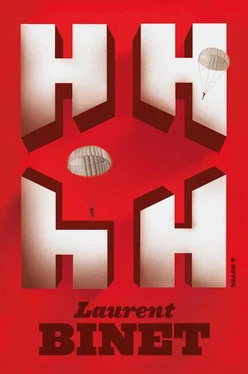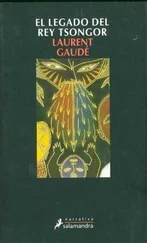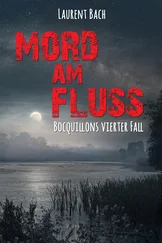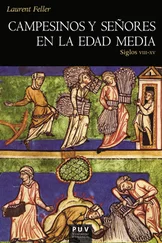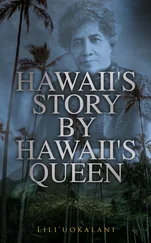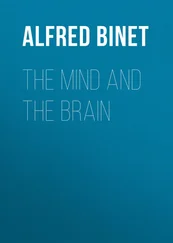Speer returns to Prague, but is received with less pomp than on his previous visit. The minister of armaments is here to discuss manpower with the Protector of one of the Reich’s biggest industrial centers. And in the spring of 1942, much more so than in December 1941—with millions of men fighting on the Eastern Front, with Soviet tanks destroying German tanks, and British bombers striking German cities with ever greater frequency—the question of manpower is vital. More workers are needed to produce more tanks, more airplanes, more artillery, more rifles, more grenades, more submarines. Not to mention those new weapons that should help the Reich finally win the war.
This time, Speer dispenses with the tour of the city and the official procession. He’s come alone, without his wife, for a work meeting with Heydrich. Neither has time to waste on small talk. Speer’s efficiency in his domain is considered the equal of Heydrich’s in his, and he is undoubtedly pleased about this. But he can’t help noticing that Heydrich not only travels without an escort but that he calmly cruises the streets of Prague in an unarmored, open-top car, with no bodyguard at all except his chauffeur. He expresses his concerns to Heydrich, who replies: “Why should my Czechs shoot at me?” Heydrich probably hasn’t read the 1937 newspaper article by Joseph Roth—the Jewish writer from Vienna, now exiled in Paris—mocking the vast amounts of money and men dedicated to protecting Nazi dignitaries. In this article, he has them say: “Yes, you see, I’ve become so great that I’m even forced to be afraid; I am so precious that I don’t have the right to die; I believe so utterly in my star that I must beware the risks that can be fatal to many a star. Who dares wins! But who has won three times over no longer needs to dare!” Joseph Roth no longer mocks anybody because he died in 1939, but perhaps Heydrich did read this article after all. It appeared in a newspaper for dissident refugees—subversive elements, no doubt closely watched by the SD. In any case, Heydrich feels duty-bound to explain part of his weltanschauung to this pampered civilian Speer: surrounding yourself with bodyguards is petit-bourgeois behavior, in very poor taste. He leaves this kind of thing to Bormann and other Party higher-ups. In fact, he refutes Joseph Roth: better to die than to let them believe you’re afraid.
Nevertheless, Heydrich’s initial reaction must have disturbed Speer: Why would anyone want to kill Heydrich? As if there weren’t already enough reasons to kill Nazi leaders in general, and Heydrich in particular! Speer has no illusions about the popularity of the Germans in the occupied territories, and he assumes that Heydrich is the same. But this man seems so sure of himself. Speer can’t tell if Heydrich’s paternalistic tone, speaking of “his” Czechs, is just an idle boast, or if Heydrich really is as powerful as he claims to be. Call him a petit-bourgeois coward if you must, but in the open-top Mercedes inching its way through the streets of Prague, Speer doesn’t feel entirely at ease.
Colonel Morávek—sole survivor of the Three Kings, last remaining chief of the three-headed Czech Resistance organization—knows that he shouldn’t attend the meeting. It has been arranged by his old friend René, alias Colonel Paul Thümmel, Abwehr officer; alias A54, the most important spy ever to have worked for Czechoslovakia. A54 has managed to warn him: his cover has been blown, and this meeting is a trap. But Morávek probably believes his own audacity will protect him. Wasn’t it audacity that saved his life so many times before? This man who used to send postcards to the head of the Gestapo to tell him what he’d done isn’t going to let himself get scared now. Arriving in the Prague park where the meeting is due to take place, he sees his contact, but also the men who are watching him. He gets ready to run off, but two men in raincoats call out from behind him. I have never witnessed a shoot-out and I have trouble imagining what it would be like in a city as peaceful as Prague is now. But there are more than fifty gunshots during the chase that follows. Morávek runs across one of the bridges that span the Vltava (unfortunately, I don’t know which) and jumps onto a moving tram. But the Gestapo are everywhere—it’s as if they’ve been teleported. They’re even inside the tram carriage. Morávek jumps off the tram, but he’s been shot in the legs. He collapses on the rails and, completely surrounded, he shoots himself. This is obviously the surest means of not telling the enemy anything. But his pockets will talk: on his body, the Germans find a photo of a man who (although they don’t know it yet) is Josef Valčík.
This story marks the end of the last chief of the Three Kings. It proves a thorn in the side of Anthropoid, because at this date—March 20, 1942—Valčík is still closely involved in the operation. It also represents a double success for Heydrich: as Protector of Bohemia and Moravia, he manages to decapitate one of the most dangerous remaining Resistance organizations, thus fulfilling his mission. And as head of the SD, he unmasks a superspy who is also an officer of the Abwehr—the secret service run by his rival and former mentor Canaris. For the Allies this isn’t the first setback and it won’t be the last, but March 20, 1942, is assuredly not a red-letter day in their secret war against the Germans.
In London they are growing impatient. It is five months now since the agents of Operation Anthropoid were parachuted into their homeland, but since then there’s been hardly any news at all. London does know, however, that Gabčík and Kubiš are alive and operational. Libuse, the only secret transmitter still working, sends information of this kind whenever there is any. So London decides to give the two agents a new mission. As ever, employers are obsessed by their employees’ productivity. This new mission adds to rather than replaces the previous one. But it also delays it. Gabčík and Kubiš are furious. They have to go to Pilsen to take part in a sabotage operation.
Pilsen is a large industrial town in the west of the country, quite close to the German border. Its famous beer, Pilsner Urquell, is named after it. However, London is not interested in Pilsner for its beer but for its Škoda factories. In 1942, Škoda doesn’t make cars—it makes armaments. An air raid is planned for the night of April 25–26. The parachutists have to light fires around the industrial complex to help the British bombers pick out their target.
So at least four parachutists travel to Pilsen. They meet up in town, at a place agreed on in advance (the Tivoli restaurant—I wonder if it still exists?), and, that night, set fire to a stable and a stack of straw near the factory.
When the bombers arrive, all they have to do is drop their bombs between these two bright marks. Unfortunately, all their bombs miss the target. So the mission is a total failure, even though the parachutists did exactly what they were asked.
Then again, Kubiš did get to know a young female shop assistant during his brief stay in Pilsen—a member of the Resistance, who helped the group fulfill its mission. With his handsome movie-star face—imagine a hybrid of Cary Grant and Tony Curtis—Kubiš was always a hit with the ladies. So, even if the operation was a bitter failure, at least he didn’t waste his time. Two weeks later—two weeks before the assassination attempt—he will write a letter to this young woman, Marie Zilanova. A careless thing to do, but luckily without consequences. I would love to know the contents of that letter. I should have copied it down in Czech when I had the chance.
Читать дальше
